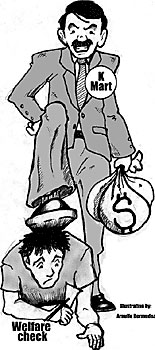
Illustration by Arnulfo Bermudez
|
By Bill Wetzel
Arizona Daily Wildcat
Friday March 7, 2003
By and large, the United States is a model for the rest of the world to follow. Over the course of the last two centuries, the lives of Americans have vastly improved. Our leadership has proven time and time again that we can overcome economic crisis and global conflict. In contrast to our sins of slavery, we now relish the diversity of our population. We have much to celebrate in the strides our young country has made in its short history.
But there is one area in particular where we are not a model ÷ an area that has recently been moving in the wrong direction.
In 1776, our leaders stated that every American should have the right to life, liberty and the pursuit of happiness. For over two centuries, we have had the obligation of fulfilling a solemn national covenant toward equal opportunity. Our commitment toward this vow needs urgent renewal. So what is this pledge that we need to reintroduce ourselves to?
There is an objectionable level of poverty that exists in a great country with considerable resources and vast wealth.
More than 40 million Americans are considered officially poor. That is almost one out of every six people. Poverty figures have more than doubled in the last 25 years and continue to increase. This includes the number of individuals and families that work full-time and are still considered poor. No jobs. No health care. No food. An event as routine as a family vacation is a pipe dream for people who are simply trying to survive.
Then consider that the impoverished often end up in destitute neighborhoods, battling socioeconomic problems such as crime, violence, poorly funded schools and lack of employment opportunities. More than 10 million Americans live in high-poverty neighborhoods and communities.
Among these numbers, minorities and women are disproportionately poorer.
One theory about why so many Americans are dirt poor is that it's their own fault. The poverty
stricken have become dependent on welfare. They will not get off the couch and go get a job. But welfare debates get old and are not what this column is about.
This column is about another view regarding why Americans are poor, and this one fits the facts better than the other.
The idea is that there are fundamental problems in our economy: problems posed by the widening gap between the affluent and impoverished, and also in the way we view women and minorities.
Most poor people are not poor by their own choice. You cannot allow this to be overlooked because the reality of the matter is most poor people would prefer employment if they could get a decent wage. The working poor do work as hard as ever, but often end up just as poor, if not more so, than they ever have been.
One of the biggest problems with our economic development is CEOs are willing to "get by" on 20 million a year while their workers make minimum wage.
Companies such as K-Mart, for example, often operate in the red and are run into the ground by a CEO who doesn't have to worry about where his next meal is coming from for the next 50 years of his life. Because of this, good jobs become replaced with bad jobs, if at all. This is not the fruit of capitalism.
It's blatant greed.
The dilemma of low-wage workers is a problem of economics and greed compounded by issues of gender and racial discrimination, which still remain integrated into our society. It is widely understood that individuals with less education are poorer than well-educated Americans.
High school dropouts earn approximately 33 percent less than they did 30 years ago, African-Americans about 50 percent less. These figures also drop for high school graduates as well. When considering just females, both high school graduates and dropouts make an additional 10 percent less.
As a nation, we need to be adamant in standing up for equal of opportunity. Our last true attack against poverty came in the '60s through a combination of civil rights, women's rights, and peace movements.
The success of these activists demonstrates that we can make significant social changes by utilizing our mass opinion and forcing our leaders to do the right thing.
We must take responsibility to make these changes occur.

